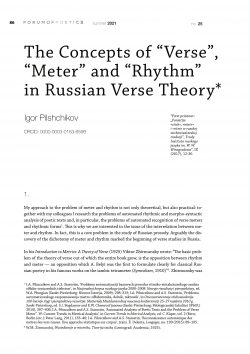
Igor Pilshchikov
A b s t r a k t
A definition is called descriptive (or theoretical) when it identifies the object by enumeration of its properties or functions. A constructive (or practical) definition is an explicit description of its arrangement. Russian verse theorists proposed several theoretical definitions of verse (as opposed to prose), which are not, however, convertible into a constructive definition (a list of formal differences between verse and prose). To date, we are still not capable of developing an algorithm which would enable us to distinguish between prose and verse in general, but leading prosodists have produced both theoretical and constructive definitions of versification systems, verse meters, verse rhythm, and particular rhythmic types of individual meters.
This article examines definitions of verse and descriptions of the relationships between meter and rhythm proposed by scholars of Russian poetry. Building on their observations, the author devises a constructive definition of the concept of “meter” as a system of permissions and prohibitions that govern the distribution of word stresses and word boundaries in a verse line. The article also formulates constructive definitions for the versification systems used in Russian poetry (such as syllabotonic verse, logaoedic verse, dolnik and taktovik, and pure accentual verse).





